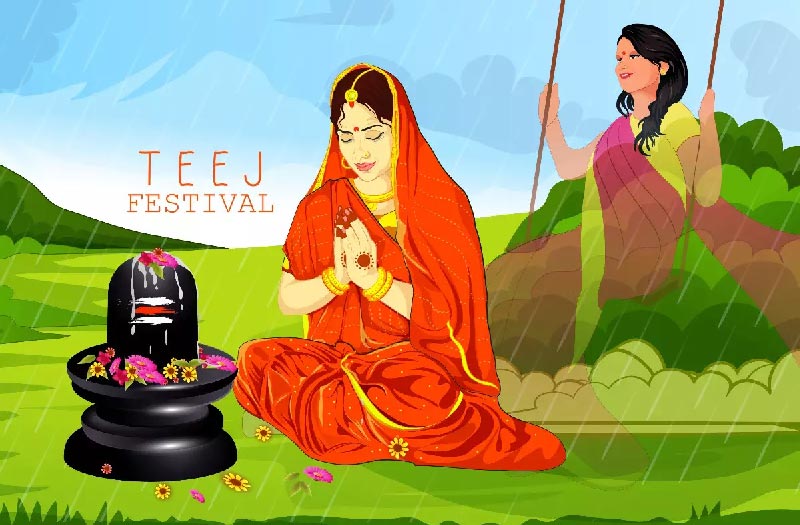
Haritalika Teej: Nepal’s Festival of Love, Devotion, and Togetherness
Haritalika Teej is one of Nepal’s most celebrated festivals, especially among Hindu women. Every year, women gather with joy and devotion to honor Lord Shiva and Goddess Parvati. Observed on the third day of the bright half of the lunar month of Bhadrapada (August–September), this festival is more than just rituals—it’s about love, strength, and unity.
On this day, women fast, pray, and sing while dressed in red saris and ornaments, creating one of the most vibrant sights in Nepali culture. For many, Teej is also a chance to connect with their inner strength and celebrate the bonds of marriage, family, and sisterhood.
The Story Behind Teej
Goddess Parvati’s Devotion to Lord Shiva
The roots of Teej lie in Hindu mythology. According to the Shiva Purana, Goddess Parvati wished to marry Lord Shiva. But her parents arranged her marriage with Lord Vishnu. To escape the arrangement, she went into the forest with her friends and began meditating and fasting.
Her dedication moved Lord Shiva, who accepted her as his wife. Their union is remembered every Teej as a symbol of patience, faith, and deep devotion.
This story also appears in texts like the Skanda Purana and Naradiya Purana, reminding devotees why fasting and prayer during Teej carry such importance.
Fasting During Teej
Different Ways of Fasting
Not all women fast in the same way. The practice depends on health, age, and personal choice. Some common forms include:
-
Nirjala Vrat – A strict fast without food or water.
-
Phalahar Vrat – Eating fruits, nuts, and drinking water.
-
Ek Bhukta Vrat – Having just one simple meal during the day.
Caring for Health
Teej fasts can be challenging. Health experts often suggest that pregnant women, nursing mothers, and those with health conditions follow a lighter version. The spirit of the festival lies in devotion, not in risking one’s well-being.
Dar: The Feast Before the Fast
The night before the fast, families celebrate with a big meal called Dar. It’s a joyful gathering filled with laughter, songs, and food that prepares women for the next day’s fast.
Typical dishes include:
-
Vegetable pulao cooked with ghee.
-
Lentil soup flavored with local herbs.
-
Yogurt with fresh seasonal fruits.
-
Pickles and sweets that bring festive cheer.
Dar is more than just eating—it’s about togetherness and celebration before stepping into a day of prayer and discipline.
Teej as a Celebration of Women
A Festival of Sisterhood
Teej is also known for bringing women together. Whether in homes or temples, women sing folk songs, dance in groups, and share their joys and struggles. These gatherings give them strength, joy, and emotional support.
Expanding Beyond Traditions
Though deeply rooted in Hindu customs, Teej has grown beyond religious lines. Women from different communities also join the celebration, making it a festival of unity and empowerment.
Where Teej Shines the Brightest
Pashupatinath Temple, Kathmandu
The Pashupatinath Temple is at the heart of Teej. Thousands of women dressed in red queue to worship Lord Shiva, turning the temple grounds into a sea of devotion and color.
Temples Across Nepal
Other Shiva temples across the country also become lively centers of celebration. From Janakpur to Pokhara, songs, dances, and prayers fill the air.
Common Questions About Teej
Is Teej Only for Women?
Traditionally, yes. But in many households today, men also take part, helping prepare for rituals or joining in prayers.
Is Teej Ever Criticized?
Some say fasting places unnecessary pressure on women. But many scholars and devotees explain that the fast is more about devotion and family well-being than social obligation. For most women, it remains a source of joy and strength.
Closing Thoughts
Haritalika Teej is not just about fasting—it’s about faith, resilience, and love. It celebrates the bond between Lord Shiva and Goddess Parvati while giving women a space to share, connect, and express themselves.
As the years pass, Teej continues to grow as a festival of unity, where tradition and togetherness meet. For those who celebrate, it is a reminder that devotion and love can bring strength to every part of life.
Festival

